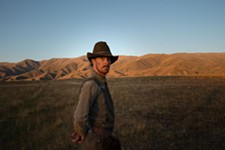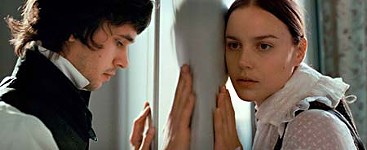An Angel at My Table
1990, R, 158 min. Directed by Jane Campion. Starring Kerry Fox, Alexia Keogh, Karen Fergusson.
REVIEWED By Marjorie Baumgarten, Fri., Sept. 20, 1991
On the surface An Angel at My Table is a straightforward biopic about the life of celebrated New Zealand author Janet Frame. But Frame's life story is anything but your typical "portrait of the artist." Then add to that the assuredly idiosyncratic direction of Campion, here making her follow-up to her debut feature film Sweetie. Angel... is based on Frame's three-part autobiography. Like Frame's books, the movie is divided into three discrete sections, a division that may owe more to its origins as a TV movie. The first part covers the author's poor but culturally nourishing childhood as one of five children. She's a pudgy, awkward, singular child with a distinctive crop of unruly red hair. The section contains a series of fleeting, but profound childhood which recount various early episodes highlighting the petty injustices encountered, the formative years of a life spent on the fringes, the pastoral lushness of the countryside, the beginning love for the written word. The middle section deals with Frame's move to the city to pursue her education, get her teaching degree and suffer a complete nervous collapse. Diagnosed as schizophrenic, she is institutionalized for eight years and undergoes over 200 electroshock treatments and is only saved from a lobotomy when her doctor learns that Frame's first book had just won a prestigious literary award. While institutionalized, she becomes devoted to her writing and it's her writing that ultimately saves her and makes her sane again. Part 3 follows the growth of the artist. She discovers that what had been falsely diagnosed as schizophrenia was, in reality, only acute shyness and an awkwardness brought about by a life spent aloof. A writer's grant allows her to travel abroad, socially connect with other creative types, lose her virginity and emerge far enough from her shell that her oddity is curbed to a socially acceptable level. One of the most amazing aspects of Angel is the unity between the three different actresses who play Frame at these different points in her life. Physically they are very similar and they all manage to adopt identical mannerisms that make the transitions seem more like a marathon in which each runner passes the baton to the next one in line rather than closed chapters of episodic saga. In many ways Angel is similar to Campion's earlier Sweetie, with their dysfunctional families and their sibling jealousies. Sweetie's surreality and perverse dimensions, however, have been toned down in Angel to a more ordinarily odd level. Yet foregrounded in each film is the overwhelming personal vision of both the characters on screen and behind the camera. What Angel doesn't manage to do well is give the viewer who's unfamiliar with Frame (and most of the audience on this continent will be) a clear sense of what makes her writing unique and of note. And despite the movie's 2 1/2 hour length, segments of Frame's story often feel abridged. Yet, I suppose it's a credit to Angel's compelling narration that we want even more detail and elaboration, instead of less. Frame's story is told with an intriguingly naked honesty but one that never drags the viewer into emotional prurience. It creates a fascinating portrait.
A note to readers: Bold and uncensored, The Austin Chronicle has been Austin’s independent news source for over 40 years, expressing the community’s political and environmental concerns and supporting its active cultural scene. Now more than ever, we need your support to continue supplying Austin with independent, free press. If real news is important to you, please consider making a donation of $5, $10 or whatever you can afford, to help keep our journalism on stands.
Richard Whittaker, Nov. 19, 2021
Marjorie Baumgarten, Sept. 25, 2009
An Angel at My Table, Jane Campion, Kerry Fox, Alexia Keogh, Karen Fergusson









